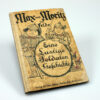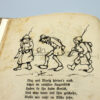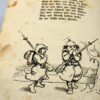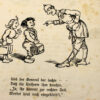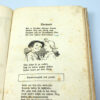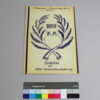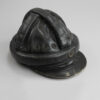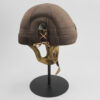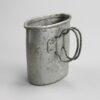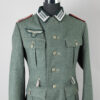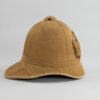Max und Moritz im Felde – Eine lustige Soldatengeschichte, Verlag Otto Schloß, Berlin 1915.
Inventory number: DPM 6.13
With this Max and Moritz picture book, the First World War also found its way into German children’s rooms in 1915. The fact that the characters were chosen as heroes for this volume was mainly due to their popularity. Wilhelm Busch’s first Max and Moritz story was rejected in 1865 because of its biting humor and brutality, as it held up a mirror to the bourgeoisie too bluntly. Seven years after his death, “Eine lustige Soldatengeschichte” (A Merry Soldier’s Tale) was published, which contained the characters and the crude humor, but no longer the social criticism of Wilhelm Busch. Max and Moritz went into military service and thus completely into the service of war propaganda.
The two characters volunteer for military service and go through all known areas of this war, from the trenches to a submarine, from the Western to the Eastern front. As well as providing an insight into military life, the children’s book also picks up on familiar stereotypes, such as good food and beautiful women in France, while in Russia people are portrayed as primitive and uncultured:
“Whoever comes out of the pure winter air
suddenly comes into the smell,
The one in the Russian farmer’s house,
He easily runs out of breath.
Such a smell is quite unspeakable,
And one wonders” How is it possible?”
[…]
Here Max and Moritz should stay,
immediately poking their sides:
‘Smells like poor people here’.”
The ruthlessness with which everyday life during the war is addressed is also surprising. For example, it is strikingly often about the inadequate meals in the military and the theft of food from the civilian population, which itself suffers from hunger:
“Sometimes in camp life
there is said to be a very late lunch,
and according to a dark legend
sometimes not until the next day.
[…]
You even want to pay cash,
Oh, you can’t get such good snacks
for hard cash,
because the people themselves don’t have it.”
Max and Moritz repeatedly find themselves in life-threatening situations in the course of the story: They drown, freeze to death and almost starve to death, are taken prisoner and are to be hanged or put themselves in danger through their pranks. But the fate of their opponents is also addressed:
“The very next moment
they have him [the Frenchman] by the scruff of the neck,
and what then happens to him,
we don’t want to see in the picture.”
This illustrated book was intended to bring war propaganda closer to even the youngest children. Everyday life as a soldier and the events of war are portrayed as dangerous, but ultimately just a great adventure at the end of which you come home again. For many of the children’s fathers, however, the soldiers’ story did not end so happily.
Object of the month
(short) stories from the depot
Unfortunately, many objects cannot currently be shown in the exhibition for conservation reasons. Here you will find unusual objects and exciting stories of special pieces from the depot


